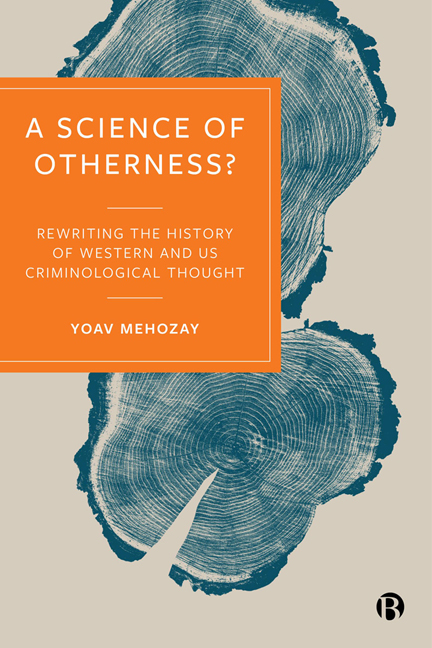Book contents
- Frontmatter
- Dedication
- Contents
- Acknowledgements
- 1 Introduction: Criminology as Otherness?
- 2 The Classical School: Otherness as an Ideology of an Imaginary Bourgeois Society
- 3 The Early Days of Positivist Criminology: An Ideology of Universalism and Otherness
- 4 Two Versions of Otherness: Between Eugenics and Modernization Theory
- 5 Otherness as Subculture
- 6 Managing the Other: Otherness in Practice
- 7 Conclusion: A Science of Otherness?
- Notes
- References
- Index
6 - Managing the Other: Otherness in Practice
Published online by Cambridge University Press: 27 March 2024
- Frontmatter
- Dedication
- Contents
- Acknowledgements
- 1 Introduction: Criminology as Otherness?
- 2 The Classical School: Otherness as an Ideology of an Imaginary Bourgeois Society
- 3 The Early Days of Positivist Criminology: An Ideology of Universalism and Otherness
- 4 Two Versions of Otherness: Between Eugenics and Modernization Theory
- 5 Otherness as Subculture
- 6 Managing the Other: Otherness in Practice
- 7 Conclusion: A Science of Otherness?
- Notes
- References
- Index
Summary
As we saw in Chapter 2, the classical school in criminology came out of the Enlightenment, and by the late nineteenth century it had been superseded by the positivist school. By the late 1960s, and even slightly before, classical criminology was making a comeback – or at least, a comeback in criminological knowledge production, though not with respect to its influence on penal jurisprudence and the criminal justice system, which never discontinued. Interestingly, this resurgence of classical thought and influences – as we discussed, for example, with respect to David Matza’s work – guided a growing body of criminological research that sat more comfortably on the political right (specifically, the law-and-order doctrine and liberal political economy). In this chapter, we shall see how such research led to neoclassical theories and a growing orientation toward administrative criminology. This body of work challenged positivist criminology insofar as it reinstated the idea of offenders as rational actors, scaling down the idea of delinquent pathology. This developing paradigm in criminological knowledge production also pointed to growing reservations about the tireless positivist effort to explain the causes of criminality, and instead promoted operational research to improve efficiency in the criminal justice system.
This chapter focuses on this paradigmatic shift, which I call the managerial movement; it is also referred to as the effectiveness movement (Clear, 2010: 3). This movement, which has been dominant in the field of criminology since the 1970s, has placed scholarly priority on the relevance and optimization of policy. More precisely, in contrast with the positivist– aetiological school’s insistence on explaining crime, for the managerial movement crime is a given: it does not need to be explained, only to be managed. As a result, the orientation of criminological research shifted toward meeting specific quantifiable objectives in the form of pragmatic evidence-based research (‘What works?’). To quote James Q. Wilson, one of the luminaries of the managerial movement:
It [causal analysis] means little for policymakers concerned with crime prevention since men cannot be changed. … [Causal analysis] operated by and large within an intellectual framework that makes it difficult or impossible to develop reasonable policy alternatives and has cast doubt, by assumption more than by argument or evidence, on the efficacy of those policy tools, necessarily dealing with objective rather than subjective conditions, which society might use to alter crime rates.
(Wilson, 1974: 5, 8, 9)- Type
- Chapter
- Information
- A Science of Otherness?Rereading the History of Western and US Criminological Thought, pp. 104 - 123Publisher: Bristol University PressPrint publication year: 2023



